|
HUMAN RIGHTS FOR EACH PERSON REGARDLESS OF AGE, RACE, RELIGION OR POLITICS
|
 |
|
|

|
|
THE DEATH PENALTY
|
|
 The death penalty is the ultimate cruel, inhuman and degrading punishment. The death penalty is the ultimate cruel, inhuman and degrading punishment.
It violates the right to life.
It is irrevocable and can be inflicted on the innocent. It has never been shown to deter crime more effectively than other punishments.
Foreign Prisoner Support Services is in total opposition to the death penalty under all circumstances in all countries. The abolition of the death penalty contributes to enhancement of human dignity and progressive development of human rights.
FPSS supports the Second Optional Protocol to the International Covenant on Civil and Political Rights, aiming at the abolition of the death penalty. Adopted and proclaimed by General Assembly resolution 44/128 of 15 December 1989. This is one of five international human rights treaties that make up the International Bill of Human Rights [below].
- Universal Declaration of Human Rights (1948)
- International Covenant on Economic, Social and Cultural Rights (1966)
- International Covenant on Civil and Political Rights (1966)
- Optional Protocol to the International Covenant on Civil and Political Rights (1966)
- Second Optional Protocol to the International Covenant on Civil and Political Rights, aiming at the abolition of the death penalty (1990)
 The Second Optional Protocol to the International Covenant on Civil and Political Rights commits signatory nations to the abolition of the death penalty. It is one of the five international human rights treaties that make up the International Bill of Human Rights. The Second Optional Protocol to the International Covenant on Civil and Political Rights commits signatory nations to the abolition of the death penalty. It is one of the five international human rights treaties that make up the International Bill of Human Rights.
The Second Optional Protocol makes it a fundamental human right not to be executed. It prohibits the execution of anyone under the law of a ratifying country.
The protocol also implicitly prohibits the reintroduction of the death penalty.
The Second Optional Protocol entered into force in international law on 11 July 1991. It has currently been ratified by 54 nations, and signed by a further 33 countries. (‘Signing’ a treaty is the first step in ratifying it, but does not bind the signatory country.)
Who's signed the Second Optional Protocol?
As of 17 November 2004 the following 54 countries had ratified the Second Optional Protocol:
|
Australia Cyprus Ireland New Zealand South Africa Austria Denmark Italy Norway Spain Azerbaijan Djibouti Leichtenstein Panama Sweden Belgium Ecuador Lithuania Paraguay Switzerland Bosnia-Herzogovina Estonia Luxembourg Portugal FYROM Bulgaria Finland Malta Romania Timor Leste Cape Verde Georgia Monaco San Marino Turkmenistan Colombia Germany Mozambique Serbia & Montenegro UK Costa Rica Greece Namibia Seychelles Uruguay Croatia Hungary Nepal Slovakia Venezuela Czech Republic Iceland Netherlands Slovenia
The highlighted countries still retain the death penalty. Those highlighted in yellow are "de facto abolitionist" countries, i.e. an execution has not occurred in these countries for the last 10 years but the death penalty has not been officially abolished.
American Samoa Cook Islands Japan New Caledonia Philippines Timor-Leste Australia Fiji Kiribati New Zealand Samoa Tokelau Bangladesh French Polynesia Laos Niue Singapore Tonga Brunei Darussalam Guam Malaysia North Korea Solomon Islands Tuvalu Burma (Myanmar) Hawaii (USA) Marshall Islands Northern Marianas South Korea Vanuatu Cambodia Hong Kong Micronesia Palau Taiwan Vietnam China Indonesia Nauru Papua New Guinea Thailand
|

Hands of death row inmate in cell of Pontiac Correctional Institution, Pontiac, Illinois, USA. Hands of death row inmate in cell of Pontiac Correctional Institution, Pontiac, Illinois, USA © AP Graphics Bank
|
Want to know more?
The NSW Council for Civil Liberties has some great informationclick here
|
|
Kyrgyzstan to End Use of Death Penalty
|
|
2005 The Associated Press Dec. 30, 2005,
BISHKEK, Kyrgyzstan — Kyrgyzstan's president effectively ended the use of the death penalty in this ex-Soviet republic by extending a moratorium on the punishment until its planned abolition, a presidential spokesman said Friday.
President Kurmanbek Bakiyev signed the decree Thursday aiming "to humanize and liberalize" the criminal code and urged parliament to support plans to do away with the death penalty, said presidential spokesman Dosali Esenaliyev.
Kyrgyzstan first imposed the moratorium in 1998 and has since repeatedly extended it.
It is unclear when the constitutional changes proposed by Bakiyev might be implemented. Some key issues, including possible curtailment of presidential powers, are expected to be decided in a referendum next year.
Bakiyev was elected president in July, following an uprising that ousted his unpopular predecessor, Askar Akayev.
Comment by FPSS Advocate Martin Hodgson
I hope this year we can see a more concerted effort to encourage all nations to abolish the death penalty. The US is clearly the most important so as to set a positive example on a global scale. Wouldn't that be nice, the US showing some leadership on human rights lol
But if one by one countries can be pressured into abolishing this barbaric act then the pressure mounts on those that still use it to remove it from their society.
|
|
A Call from a Death Row Prisoner
|
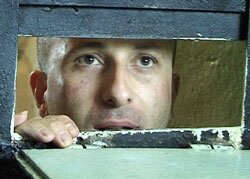
A prisoner on death row in Armenia.
|
(February 5, 2003) Internews Armenia's investigative television program, "Khndir," has generated a strong reaction from viewers after a January edition about the death penalty reported on prison conditions for death row prisoners, possible violations in the investigations of criminal cases, and abolition of the death penalty. There is a moratorium on the death penalty in Armenia since abolishing capital punishment is a requirement of membership in the European Council.
When the first segment of the investigative piece was still in pre-production, a death row prisoner chose to use his right for a once-a-month telephone call to talk to the show’s producer, Harutyun Mansuryan, instead of calling home. February’s edition of "Khndir" will focus on violations in his case. Mansuryan said, "We are having phone calls from the relatives of death prisoners every day. They know that the piece is to be continued and are expecting thorough television investigation of the cases that may lead to post-conviction review."
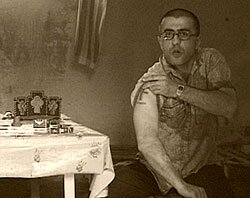
Man showing his tattoo
|
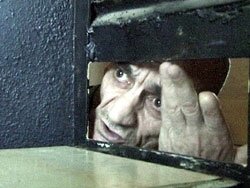
Old man looking through window on cell door
|
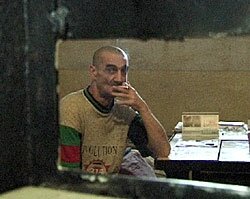
Man sitting in his cell
|
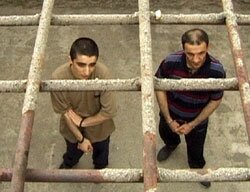
Two men standing under barred ceiling
|
"Khndir" (the word has two meanings in Armenian – "a task" and "an arithmetic problem") is a thirty-minute program committed to in-depth investigations of social issues. The program is broadcast on Shoghakat TV channel in Yerevan.
Internews' work in Armenia is funded in part by grants from the U.S. Agency for International Development.
|
|
Lethal Injection
|
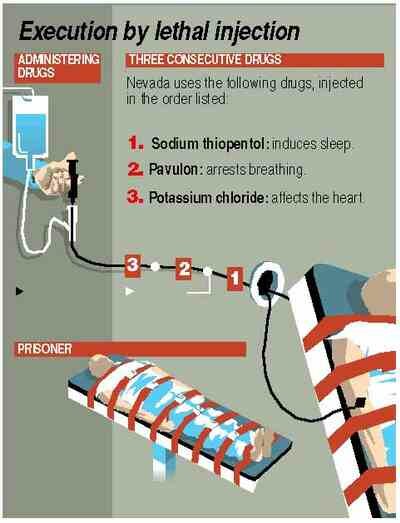
|
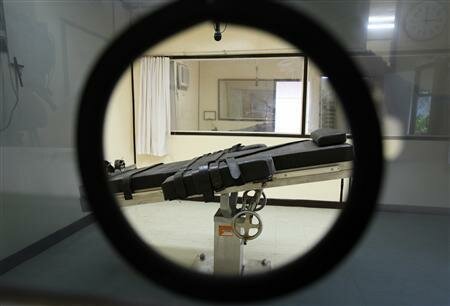
A view of the "lethal injection chamber" at New Bilibid Prison, the Philippines main prison where more than 1000 men sit on death row, south of Manila June 23, 2006. Philippine President Gloria Macapagal Arroyo signed on Saturday a new law repealing state executions ahead of her visit to the Vatican next week. Picture taken June 23, 2006. REUTERS/Darren Whiteside
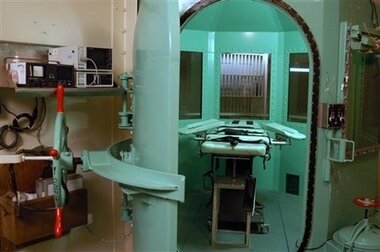
A lethal injection table is shown in California's San Quentin Prison in this January 1996 file photo.
|
|
|
Other Death Penalty Information
|
|
|
FREEDOM IS A RIGHT OF ALL HUMAN BEINGS IN A WORLD WHERE LIFE IS VALUED AND PEACE MAY FINALLY BE A POSSIBILITY
|
FPSS DO NOT ACCEPT DONATIONS OR COLLECT MONEY FOR OR ON BEHALF OF PRISONERS OR THEIR FAMILIES.
|
|
|

|
|
Just in case you forgot - read the Universal declaration of Human Rights
|
|
|